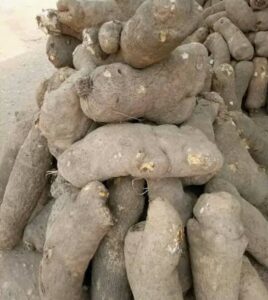Yam farmers in the Federal Capital Territory (FCT) have attributed the poor and low yield of yams this year to late rainfall.
The farmers, in separate interviews on Thursday in Abuja, said this had led to a poor harvest of yam this year compared to the previous year.
Philip Kutayi, one of the farmers, said that Bwari was known for its yam production in the FCT and a supplier to many retailers.
He, however, said that this year was a bit different because those who had harvested so far had recorded low yields and rotten produce.
“Most of us cannot even boast of enough to take home, not to mention taking to the market for sale.
“This year’s harvest was just somehow, and I think it is because the rains did not come early.
“I was lucky to have a few good ones; some of my fellow farmers got rotten produce in spite of their effort. Some planted sweet potatoes immediately to compensate.”
Kutayi added that although the prices of yams may be high in the market because of other economic factors, he was hopeful that the prices would reduce soon.
Similarly, Dahilo Mathew, another yam farmer, told NAN that he cultivated his produce early enough, but the rains came a bit late, and that affected his yield.
He said: “Last year, I was able to harvest over 400 tubers from what I cultivated and sold very well and also got to keep good seedlings, but this season, there are too many issues.
“It started with the effect of climate change, then hungry thieves who stole the yams, and now, transportation and logistics may determine the market price for those who have enough to sell.”
In a similar development, some yam sellers in Gwagwalada area said the rising cost of transportation and insecurity in the country had a negative impact on sales.
Eunice David, one of the sellers, said that the commodity had recorded low patronage as a result of an increase in its price.
She added that consumers now sought other alternatives like sweet potatoes.
“We spend a lot to transport yam from Ekiti and Ondo states down to Abuja.
“Initially, we pay N5,000 for transportation, but now we pay as high as N20,000 and above to bring down the produce from these states.
“By now, yam is supposed to be cheap because this is the harvest season, but with the cost of fuel and what the farmers are facing, it is making it more expensive.”
Comparing the produce to last year’s sale, David said that five average-sized tubers used to cost between N4,000 to N5,000, but now it ranged between N8,000 to N11,000.
She said while the bigger sizes sold between N11,000 to N16,000, compared to N6,000 to N8,000 in the past.
She also explained that some of the farmers had expressed fear of going to their farms to either cultivate or harvest due to the insecurity challenge they faced.
This, David added, had affected supplies.
Ladi Adejoh, another yam seller, however, said that she was optimistic that the cost of the produce might go down irrespective of the present economic challenges.
She also added that many farmers in the FCT were yet to harvest their produce, and so believed that when they did, the price may come down.
“I know the prices of yam might come down when farmers in Abuja start harvesting the common Makakusa yam; by then, there will be a slight fall in the price.
What we have in the markets now is only the Jalingo and Daonitsha yam from other states; that’s why it is still expensive.”
NAN


 Latest6 days ago
Latest6 days ago
 Trends7 days ago
Trends7 days ago
 Health1 week ago
Health1 week ago
 Football1 week ago
Football1 week ago
 Football1 week ago
Football1 week ago
 Latest1 week ago
Latest1 week ago
 Health1 week ago
Health1 week ago
 Latest1 week ago
Latest1 week ago
